Report on Quality Assurance of Produce in Organic Farming Practices
VerifiedAdded on 2022/11/01
|9
|2744
|289
Report
AI Summary
This report provides a comprehensive overview of quality assurance in organic farming, focusing on the Australian context, particularly Tasmania. It highlights the importance of quality assurance in ensuring food safety and consumer confidence, addressing potential hazards from planting to distribution. The report delves into organic farming principles, practices, and the role of certifications in maintaining product integrity. It examines the increasing demand for organic food, market trends, and the specific dynamics of the Tasmanian organic industry, including inputs, outputs, and customer preferences. The conclusion emphasizes the need for compliance with regulations, proper certification, and collaborative efforts to address challenges faced by organic farmers, ultimately advocating for the sustainable growth of the organic sector.
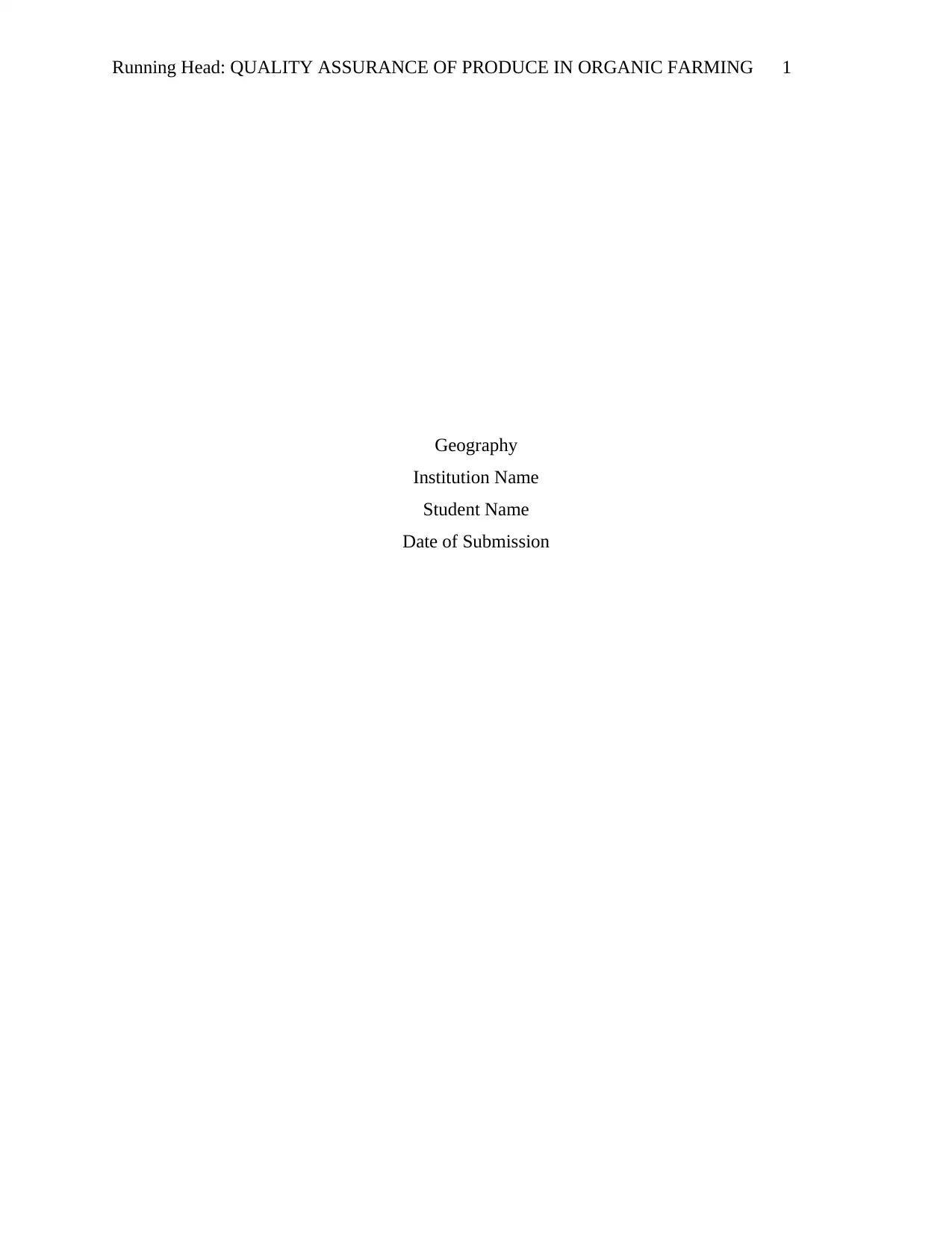
Running Head: QUALITY ASSURANCE OF PRODUCE IN ORGANIC FARMING 1
Geography
Institution Name
Student Name
Date of Submission
Geography
Institution Name
Student Name
Date of Submission
Paraphrase This Document
Need a fresh take? Get an instant paraphrase of this document with our AI Paraphraser
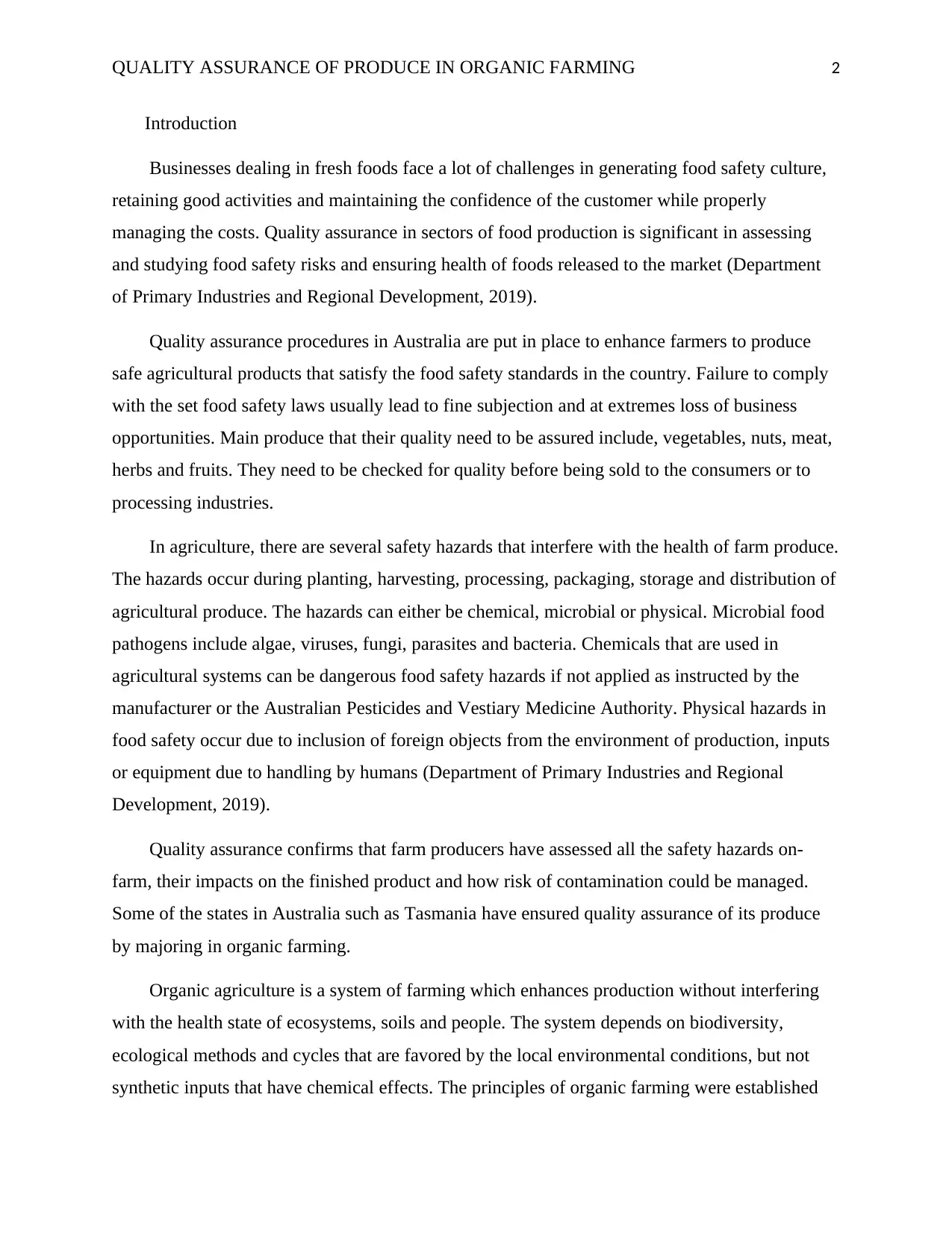
QUALITY ASSURANCE OF PRODUCE IN ORGANIC FARMING 2
Introduction
Businesses dealing in fresh foods face a lot of challenges in generating food safety culture,
retaining good activities and maintaining the confidence of the customer while properly
managing the costs. Quality assurance in sectors of food production is significant in assessing
and studying food safety risks and ensuring health of foods released to the market (Department
of Primary Industries and Regional Development, 2019).
Quality assurance procedures in Australia are put in place to enhance farmers to produce
safe agricultural products that satisfy the food safety standards in the country. Failure to comply
with the set food safety laws usually lead to fine subjection and at extremes loss of business
opportunities. Main produce that their quality need to be assured include, vegetables, nuts, meat,
herbs and fruits. They need to be checked for quality before being sold to the consumers or to
processing industries.
In agriculture, there are several safety hazards that interfere with the health of farm produce.
The hazards occur during planting, harvesting, processing, packaging, storage and distribution of
agricultural produce. The hazards can either be chemical, microbial or physical. Microbial food
pathogens include algae, viruses, fungi, parasites and bacteria. Chemicals that are used in
agricultural systems can be dangerous food safety hazards if not applied as instructed by the
manufacturer or the Australian Pesticides and Vestiary Medicine Authority. Physical hazards in
food safety occur due to inclusion of foreign objects from the environment of production, inputs
or equipment due to handling by humans (Department of Primary Industries and Regional
Development, 2019).
Quality assurance confirms that farm producers have assessed all the safety hazards on-
farm, their impacts on the finished product and how risk of contamination could be managed.
Some of the states in Australia such as Tasmania have ensured quality assurance of its produce
by majoring in organic farming.
Organic agriculture is a system of farming which enhances production without interfering
with the health state of ecosystems, soils and people. The system depends on biodiversity,
ecological methods and cycles that are favored by the local environmental conditions, but not
synthetic inputs that have chemical effects. The principles of organic farming were established
Introduction
Businesses dealing in fresh foods face a lot of challenges in generating food safety culture,
retaining good activities and maintaining the confidence of the customer while properly
managing the costs. Quality assurance in sectors of food production is significant in assessing
and studying food safety risks and ensuring health of foods released to the market (Department
of Primary Industries and Regional Development, 2019).
Quality assurance procedures in Australia are put in place to enhance farmers to produce
safe agricultural products that satisfy the food safety standards in the country. Failure to comply
with the set food safety laws usually lead to fine subjection and at extremes loss of business
opportunities. Main produce that their quality need to be assured include, vegetables, nuts, meat,
herbs and fruits. They need to be checked for quality before being sold to the consumers or to
processing industries.
In agriculture, there are several safety hazards that interfere with the health of farm produce.
The hazards occur during planting, harvesting, processing, packaging, storage and distribution of
agricultural produce. The hazards can either be chemical, microbial or physical. Microbial food
pathogens include algae, viruses, fungi, parasites and bacteria. Chemicals that are used in
agricultural systems can be dangerous food safety hazards if not applied as instructed by the
manufacturer or the Australian Pesticides and Vestiary Medicine Authority. Physical hazards in
food safety occur due to inclusion of foreign objects from the environment of production, inputs
or equipment due to handling by humans (Department of Primary Industries and Regional
Development, 2019).
Quality assurance confirms that farm producers have assessed all the safety hazards on-
farm, their impacts on the finished product and how risk of contamination could be managed.
Some of the states in Australia such as Tasmania have ensured quality assurance of its produce
by majoring in organic farming.
Organic agriculture is a system of farming which enhances production without interfering
with the health state of ecosystems, soils and people. The system depends on biodiversity,
ecological methods and cycles that are favored by the local environmental conditions, but not
synthetic inputs that have chemical effects. The principles of organic farming were established
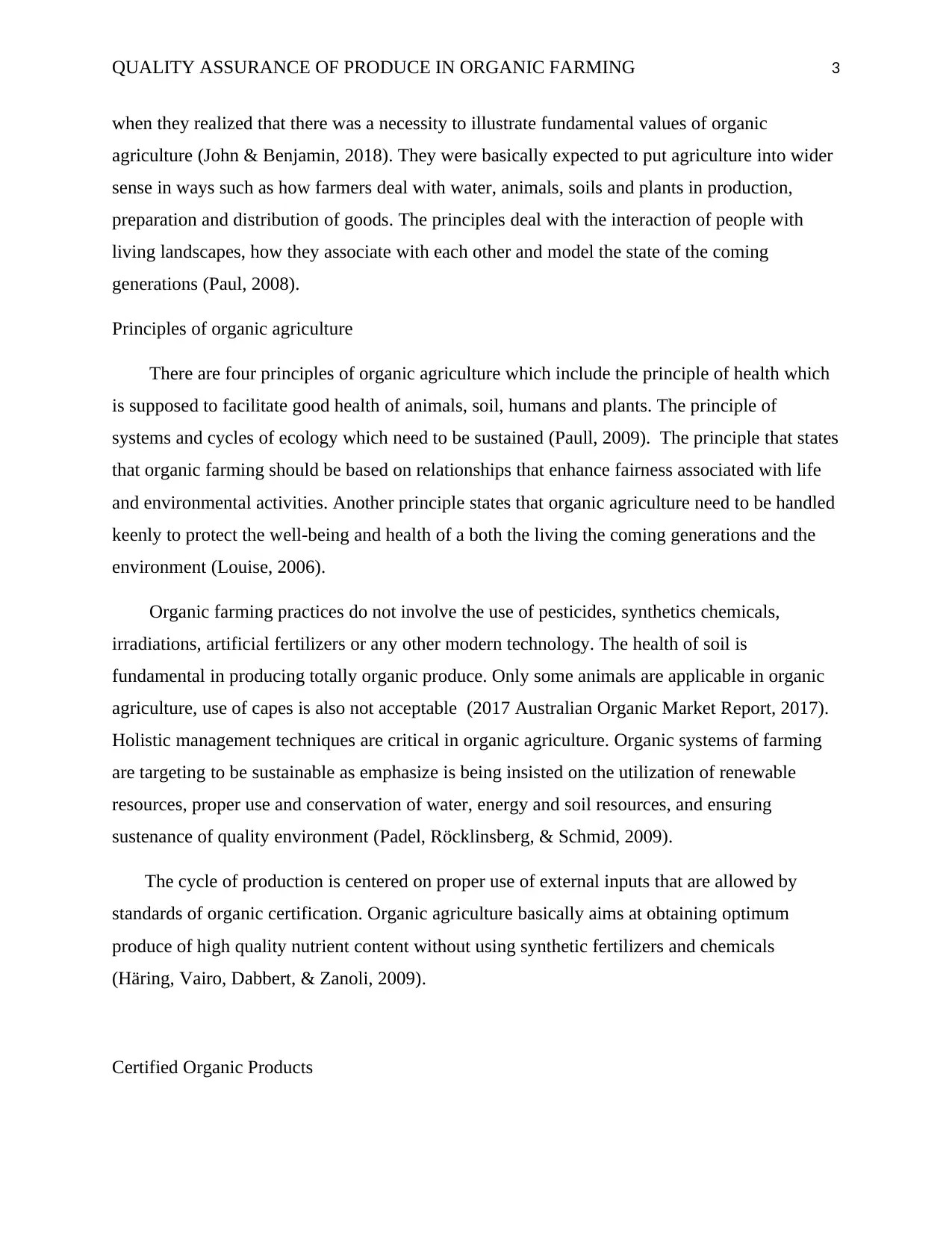
QUALITY ASSURANCE OF PRODUCE IN ORGANIC FARMING 3
when they realized that there was a necessity to illustrate fundamental values of organic
agriculture (John & Benjamin, 2018). They were basically expected to put agriculture into wider
sense in ways such as how farmers deal with water, animals, soils and plants in production,
preparation and distribution of goods. The principles deal with the interaction of people with
living landscapes, how they associate with each other and model the state of the coming
generations (Paul, 2008).
Principles of organic agriculture
There are four principles of organic agriculture which include the principle of health which
is supposed to facilitate good health of animals, soil, humans and plants. The principle of
systems and cycles of ecology which need to be sustained (Paull, 2009). The principle that states
that organic farming should be based on relationships that enhance fairness associated with life
and environmental activities. Another principle states that organic agriculture need to be handled
keenly to protect the well-being and health of a both the living the coming generations and the
environment (Louise, 2006).
Organic farming practices do not involve the use of pesticides, synthetics chemicals,
irradiations, artificial fertilizers or any other modern technology. The health of soil is
fundamental in producing totally organic produce. Only some animals are applicable in organic
agriculture, use of capes is also not acceptable (2017 Australian Organic Market Report, 2017).
Holistic management techniques are critical in organic agriculture. Organic systems of farming
are targeting to be sustainable as emphasize is being insisted on the utilization of renewable
resources, proper use and conservation of water, energy and soil resources, and ensuring
sustenance of quality environment (Padel, Röcklinsberg, & Schmid, 2009).
The cycle of production is centered on proper use of external inputs that are allowed by
standards of organic certification. Organic agriculture basically aims at obtaining optimum
produce of high quality nutrient content without using synthetic fertilizers and chemicals
(Häring, Vairo, Dabbert, & Zanoli, 2009).
Certified Organic Products
when they realized that there was a necessity to illustrate fundamental values of organic
agriculture (John & Benjamin, 2018). They were basically expected to put agriculture into wider
sense in ways such as how farmers deal with water, animals, soils and plants in production,
preparation and distribution of goods. The principles deal with the interaction of people with
living landscapes, how they associate with each other and model the state of the coming
generations (Paul, 2008).
Principles of organic agriculture
There are four principles of organic agriculture which include the principle of health which
is supposed to facilitate good health of animals, soil, humans and plants. The principle of
systems and cycles of ecology which need to be sustained (Paull, 2009). The principle that states
that organic farming should be based on relationships that enhance fairness associated with life
and environmental activities. Another principle states that organic agriculture need to be handled
keenly to protect the well-being and health of a both the living the coming generations and the
environment (Louise, 2006).
Organic farming practices do not involve the use of pesticides, synthetics chemicals,
irradiations, artificial fertilizers or any other modern technology. The health of soil is
fundamental in producing totally organic produce. Only some animals are applicable in organic
agriculture, use of capes is also not acceptable (2017 Australian Organic Market Report, 2017).
Holistic management techniques are critical in organic agriculture. Organic systems of farming
are targeting to be sustainable as emphasize is being insisted on the utilization of renewable
resources, proper use and conservation of water, energy and soil resources, and ensuring
sustenance of quality environment (Padel, Röcklinsberg, & Schmid, 2009).
The cycle of production is centered on proper use of external inputs that are allowed by
standards of organic certification. Organic agriculture basically aims at obtaining optimum
produce of high quality nutrient content without using synthetic fertilizers and chemicals
(Häring, Vairo, Dabbert, & Zanoli, 2009).
Certified Organic Products
⊘ This is a preview!⊘
Do you want full access?
Subscribe today to unlock all pages.

Trusted by 1+ million students worldwide
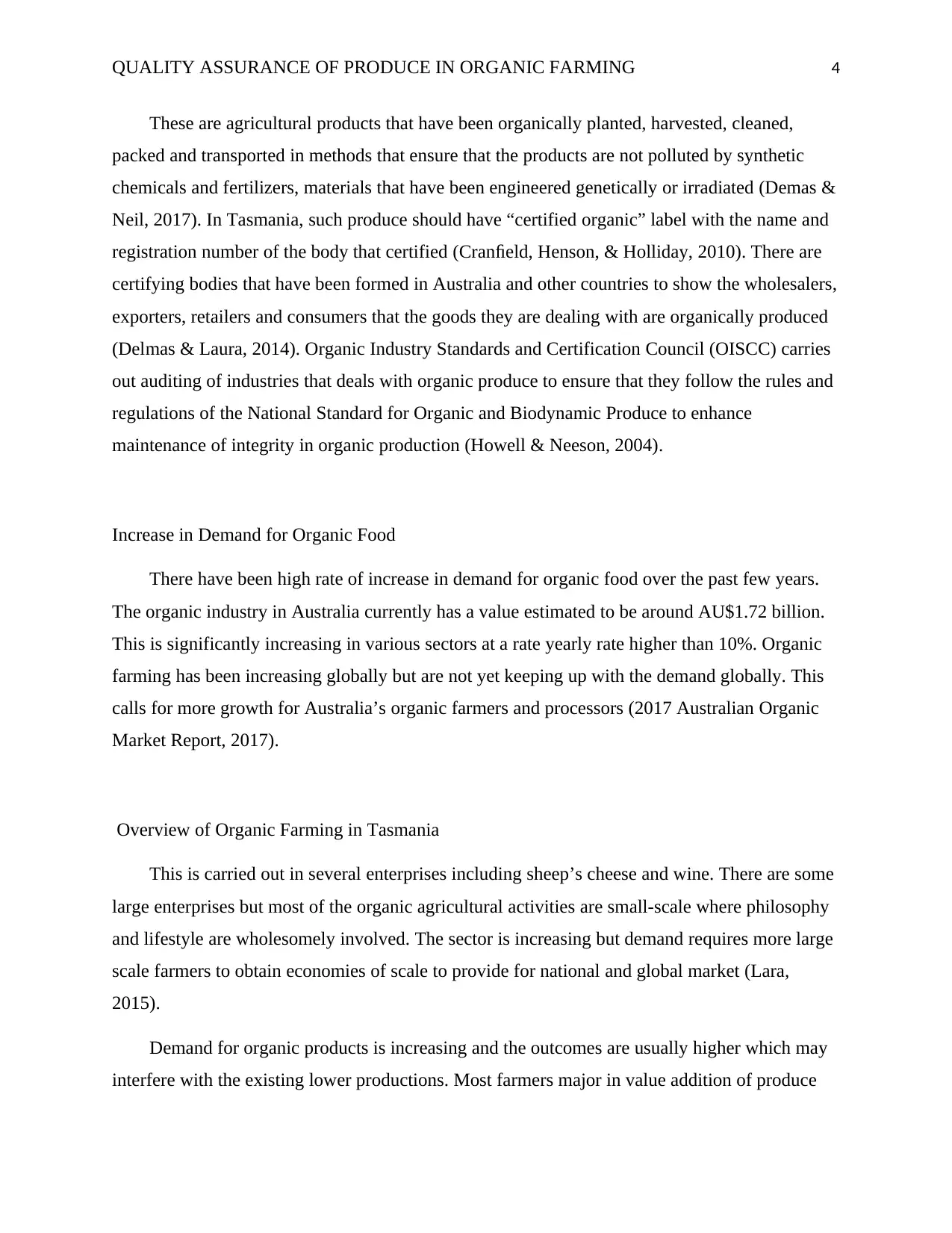
QUALITY ASSURANCE OF PRODUCE IN ORGANIC FARMING 4
These are agricultural products that have been organically planted, harvested, cleaned,
packed and transported in methods that ensure that the products are not polluted by synthetic
chemicals and fertilizers, materials that have been engineered genetically or irradiated (Demas &
Neil, 2017). In Tasmania, such produce should have “certified organic” label with the name and
registration number of the body that certified (Cranfield, Henson, & Holliday, 2010). There are
certifying bodies that have been formed in Australia and other countries to show the wholesalers,
exporters, retailers and consumers that the goods they are dealing with are organically produced
(Delmas & Laura, 2014). Organic Industry Standards and Certification Council (OISCC) carries
out auditing of industries that deals with organic produce to ensure that they follow the rules and
regulations of the National Standard for Organic and Biodynamic Produce to enhance
maintenance of integrity in organic production (Howell & Neeson, 2004).
Increase in Demand for Organic Food
There have been high rate of increase in demand for organic food over the past few years.
The organic industry in Australia currently has a value estimated to be around AU$1.72 billion.
This is significantly increasing in various sectors at a rate yearly rate higher than 10%. Organic
farming has been increasing globally but are not yet keeping up with the demand globally. This
calls for more growth for Australia’s organic farmers and processors (2017 Australian Organic
Market Report, 2017).
Overview of Organic Farming in Tasmania
This is carried out in several enterprises including sheep’s cheese and wine. There are some
large enterprises but most of the organic agricultural activities are small-scale where philosophy
and lifestyle are wholesomely involved. The sector is increasing but demand requires more large
scale farmers to obtain economies of scale to provide for national and global market (Lara,
2015).
Demand for organic products is increasing and the outcomes are usually higher which may
interfere with the existing lower productions. Most farmers major in value addition of produce
These are agricultural products that have been organically planted, harvested, cleaned,
packed and transported in methods that ensure that the products are not polluted by synthetic
chemicals and fertilizers, materials that have been engineered genetically or irradiated (Demas &
Neil, 2017). In Tasmania, such produce should have “certified organic” label with the name and
registration number of the body that certified (Cranfield, Henson, & Holliday, 2010). There are
certifying bodies that have been formed in Australia and other countries to show the wholesalers,
exporters, retailers and consumers that the goods they are dealing with are organically produced
(Delmas & Laura, 2014). Organic Industry Standards and Certification Council (OISCC) carries
out auditing of industries that deals with organic produce to ensure that they follow the rules and
regulations of the National Standard for Organic and Biodynamic Produce to enhance
maintenance of integrity in organic production (Howell & Neeson, 2004).
Increase in Demand for Organic Food
There have been high rate of increase in demand for organic food over the past few years.
The organic industry in Australia currently has a value estimated to be around AU$1.72 billion.
This is significantly increasing in various sectors at a rate yearly rate higher than 10%. Organic
farming has been increasing globally but are not yet keeping up with the demand globally. This
calls for more growth for Australia’s organic farmers and processors (2017 Australian Organic
Market Report, 2017).
Overview of Organic Farming in Tasmania
This is carried out in several enterprises including sheep’s cheese and wine. There are some
large enterprises but most of the organic agricultural activities are small-scale where philosophy
and lifestyle are wholesomely involved. The sector is increasing but demand requires more large
scale farmers to obtain economies of scale to provide for national and global market (Lara,
2015).
Demand for organic products is increasing and the outcomes are usually higher which may
interfere with the existing lower productions. Most farmers major in value addition of produce
Paraphrase This Document
Need a fresh take? Get an instant paraphrase of this document with our AI Paraphraser
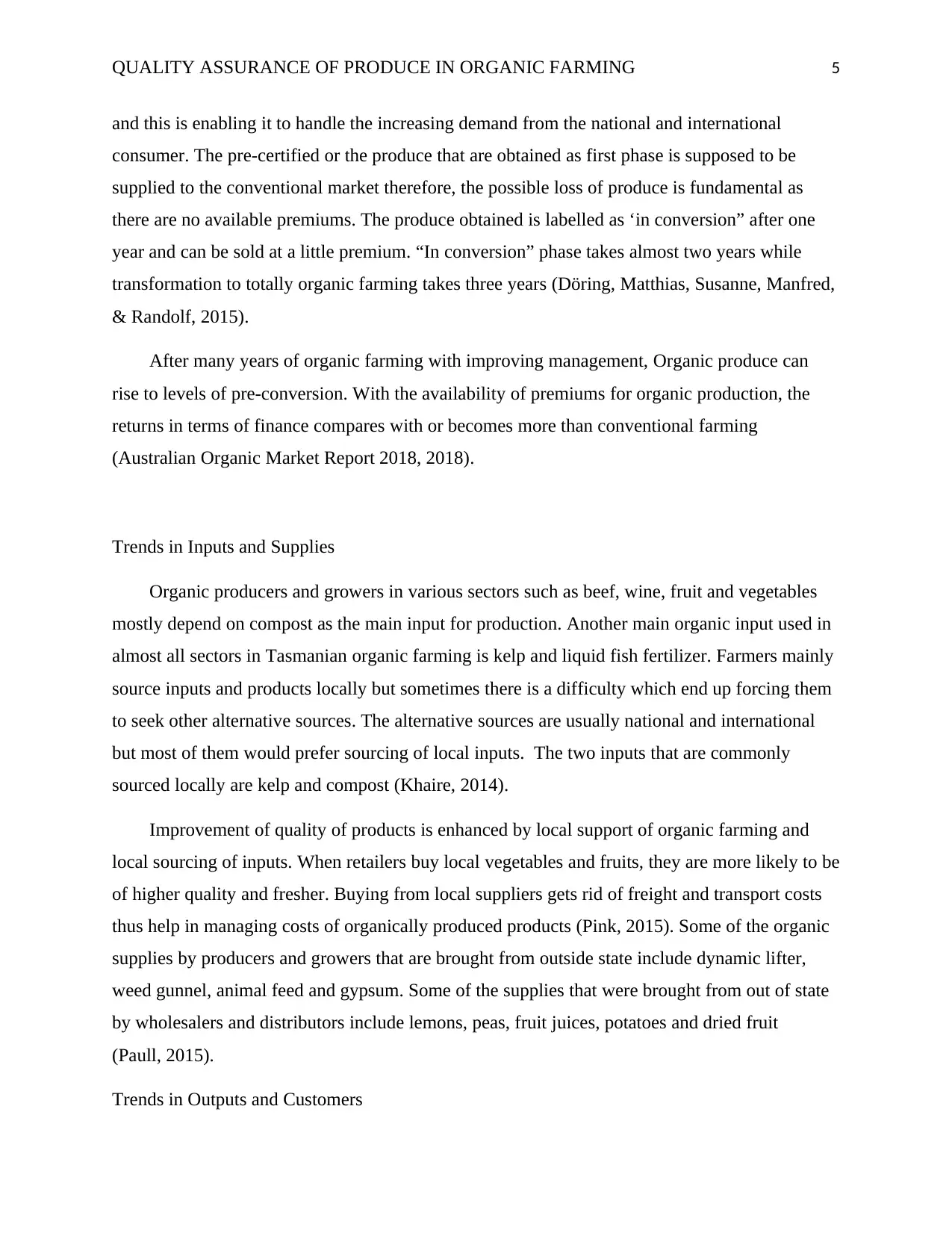
QUALITY ASSURANCE OF PRODUCE IN ORGANIC FARMING 5
and this is enabling it to handle the increasing demand from the national and international
consumer. The pre-certified or the produce that are obtained as first phase is supposed to be
supplied to the conventional market therefore, the possible loss of produce is fundamental as
there are no available premiums. The produce obtained is labelled as ‘in conversion” after one
year and can be sold at a little premium. “In conversion” phase takes almost two years while
transformation to totally organic farming takes three years (Döring, Matthias, Susanne, Manfred,
& Randolf, 2015).
After many years of organic farming with improving management, Organic produce can
rise to levels of pre-conversion. With the availability of premiums for organic production, the
returns in terms of finance compares with or becomes more than conventional farming
(Australian Organic Market Report 2018, 2018).
Trends in Inputs and Supplies
Organic producers and growers in various sectors such as beef, wine, fruit and vegetables
mostly depend on compost as the main input for production. Another main organic input used in
almost all sectors in Tasmanian organic farming is kelp and liquid fish fertilizer. Farmers mainly
source inputs and products locally but sometimes there is a difficulty which end up forcing them
to seek other alternative sources. The alternative sources are usually national and international
but most of them would prefer sourcing of local inputs. The two inputs that are commonly
sourced locally are kelp and compost (Khaire, 2014).
Improvement of quality of products is enhanced by local support of organic farming and
local sourcing of inputs. When retailers buy local vegetables and fruits, they are more likely to be
of higher quality and fresher. Buying from local suppliers gets rid of freight and transport costs
thus help in managing costs of organically produced products (Pink, 2015). Some of the organic
supplies by producers and growers that are brought from outside state include dynamic lifter,
weed gunnel, animal feed and gypsum. Some of the supplies that were brought from out of state
by wholesalers and distributors include lemons, peas, fruit juices, potatoes and dried fruit
(Paull, 2015).
Trends in Outputs and Customers
and this is enabling it to handle the increasing demand from the national and international
consumer. The pre-certified or the produce that are obtained as first phase is supposed to be
supplied to the conventional market therefore, the possible loss of produce is fundamental as
there are no available premiums. The produce obtained is labelled as ‘in conversion” after one
year and can be sold at a little premium. “In conversion” phase takes almost two years while
transformation to totally organic farming takes three years (Döring, Matthias, Susanne, Manfred,
& Randolf, 2015).
After many years of organic farming with improving management, Organic produce can
rise to levels of pre-conversion. With the availability of premiums for organic production, the
returns in terms of finance compares with or becomes more than conventional farming
(Australian Organic Market Report 2018, 2018).
Trends in Inputs and Supplies
Organic producers and growers in various sectors such as beef, wine, fruit and vegetables
mostly depend on compost as the main input for production. Another main organic input used in
almost all sectors in Tasmanian organic farming is kelp and liquid fish fertilizer. Farmers mainly
source inputs and products locally but sometimes there is a difficulty which end up forcing them
to seek other alternative sources. The alternative sources are usually national and international
but most of them would prefer sourcing of local inputs. The two inputs that are commonly
sourced locally are kelp and compost (Khaire, 2014).
Improvement of quality of products is enhanced by local support of organic farming and
local sourcing of inputs. When retailers buy local vegetables and fruits, they are more likely to be
of higher quality and fresher. Buying from local suppliers gets rid of freight and transport costs
thus help in managing costs of organically produced products (Pink, 2015). Some of the organic
supplies by producers and growers that are brought from outside state include dynamic lifter,
weed gunnel, animal feed and gypsum. Some of the supplies that were brought from out of state
by wholesalers and distributors include lemons, peas, fruit juices, potatoes and dried fruit
(Paull, 2015).
Trends in Outputs and Customers
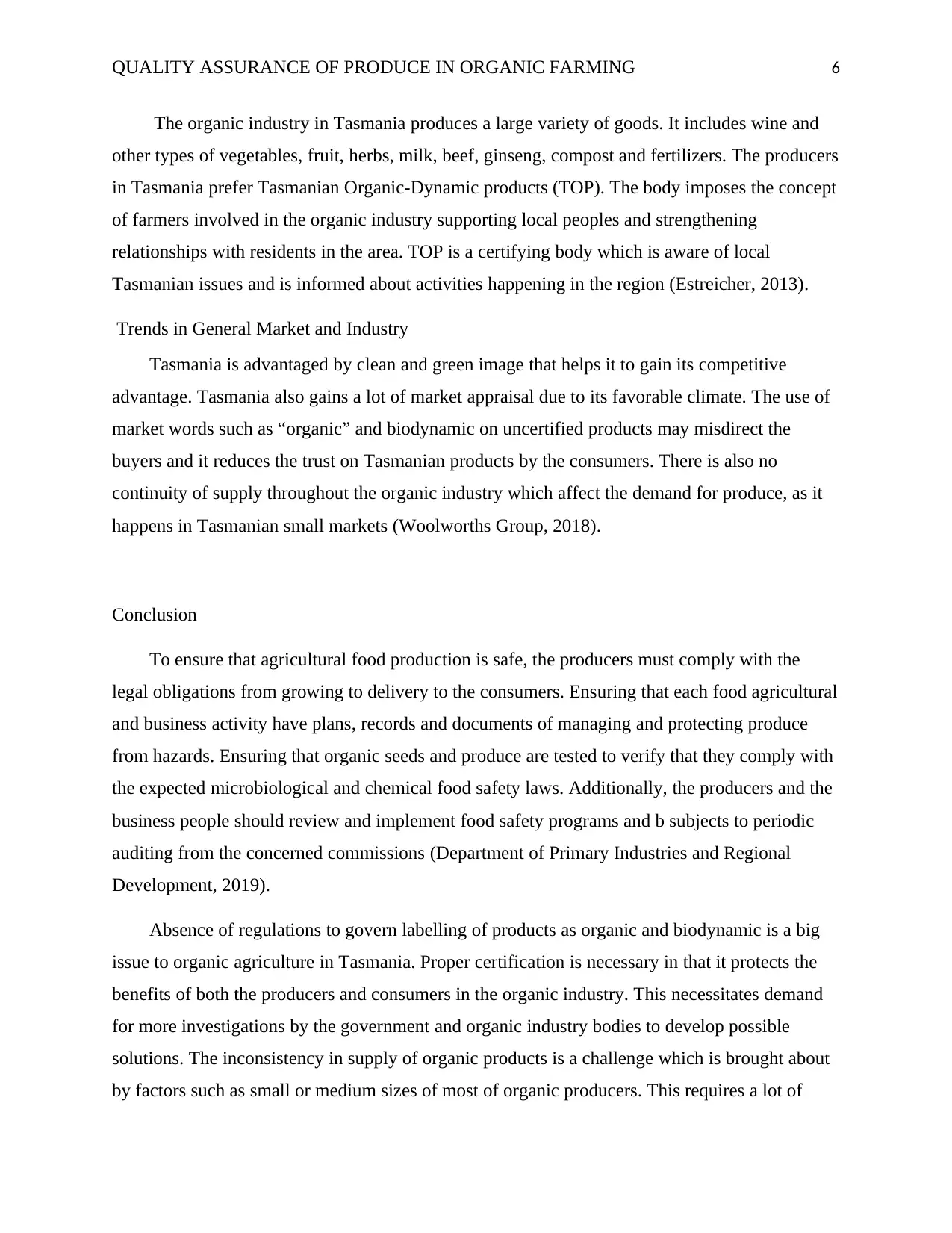
QUALITY ASSURANCE OF PRODUCE IN ORGANIC FARMING 6
The organic industry in Tasmania produces a large variety of goods. It includes wine and
other types of vegetables, fruit, herbs, milk, beef, ginseng, compost and fertilizers. The producers
in Tasmania prefer Tasmanian Organic-Dynamic products (TOP). The body imposes the concept
of farmers involved in the organic industry supporting local peoples and strengthening
relationships with residents in the area. TOP is a certifying body which is aware of local
Tasmanian issues and is informed about activities happening in the region (Estreicher, 2013).
Trends in General Market and Industry
Tasmania is advantaged by clean and green image that helps it to gain its competitive
advantage. Tasmania also gains a lot of market appraisal due to its favorable climate. The use of
market words such as “organic” and biodynamic on uncertified products may misdirect the
buyers and it reduces the trust on Tasmanian products by the consumers. There is also no
continuity of supply throughout the organic industry which affect the demand for produce, as it
happens in Tasmanian small markets (Woolworths Group, 2018).
Conclusion
To ensure that agricultural food production is safe, the producers must comply with the
legal obligations from growing to delivery to the consumers. Ensuring that each food agricultural
and business activity have plans, records and documents of managing and protecting produce
from hazards. Ensuring that organic seeds and produce are tested to verify that they comply with
the expected microbiological and chemical food safety laws. Additionally, the producers and the
business people should review and implement food safety programs and b subjects to periodic
auditing from the concerned commissions (Department of Primary Industries and Regional
Development, 2019).
Absence of regulations to govern labelling of products as organic and biodynamic is a big
issue to organic agriculture in Tasmania. Proper certification is necessary in that it protects the
benefits of both the producers and consumers in the organic industry. This necessitates demand
for more investigations by the government and organic industry bodies to develop possible
solutions. The inconsistency in supply of organic products is a challenge which is brought about
by factors such as small or medium sizes of most of organic producers. This requires a lot of
The organic industry in Tasmania produces a large variety of goods. It includes wine and
other types of vegetables, fruit, herbs, milk, beef, ginseng, compost and fertilizers. The producers
in Tasmania prefer Tasmanian Organic-Dynamic products (TOP). The body imposes the concept
of farmers involved in the organic industry supporting local peoples and strengthening
relationships with residents in the area. TOP is a certifying body which is aware of local
Tasmanian issues and is informed about activities happening in the region (Estreicher, 2013).
Trends in General Market and Industry
Tasmania is advantaged by clean and green image that helps it to gain its competitive
advantage. Tasmania also gains a lot of market appraisal due to its favorable climate. The use of
market words such as “organic” and biodynamic on uncertified products may misdirect the
buyers and it reduces the trust on Tasmanian products by the consumers. There is also no
continuity of supply throughout the organic industry which affect the demand for produce, as it
happens in Tasmanian small markets (Woolworths Group, 2018).
Conclusion
To ensure that agricultural food production is safe, the producers must comply with the
legal obligations from growing to delivery to the consumers. Ensuring that each food agricultural
and business activity have plans, records and documents of managing and protecting produce
from hazards. Ensuring that organic seeds and produce are tested to verify that they comply with
the expected microbiological and chemical food safety laws. Additionally, the producers and the
business people should review and implement food safety programs and b subjects to periodic
auditing from the concerned commissions (Department of Primary Industries and Regional
Development, 2019).
Absence of regulations to govern labelling of products as organic and biodynamic is a big
issue to organic agriculture in Tasmania. Proper certification is necessary in that it protects the
benefits of both the producers and consumers in the organic industry. This necessitates demand
for more investigations by the government and organic industry bodies to develop possible
solutions. The inconsistency in supply of organic products is a challenge which is brought about
by factors such as small or medium sizes of most of organic producers. This requires a lot of
⊘ This is a preview!⊘
Do you want full access?
Subscribe today to unlock all pages.

Trusted by 1+ million students worldwide
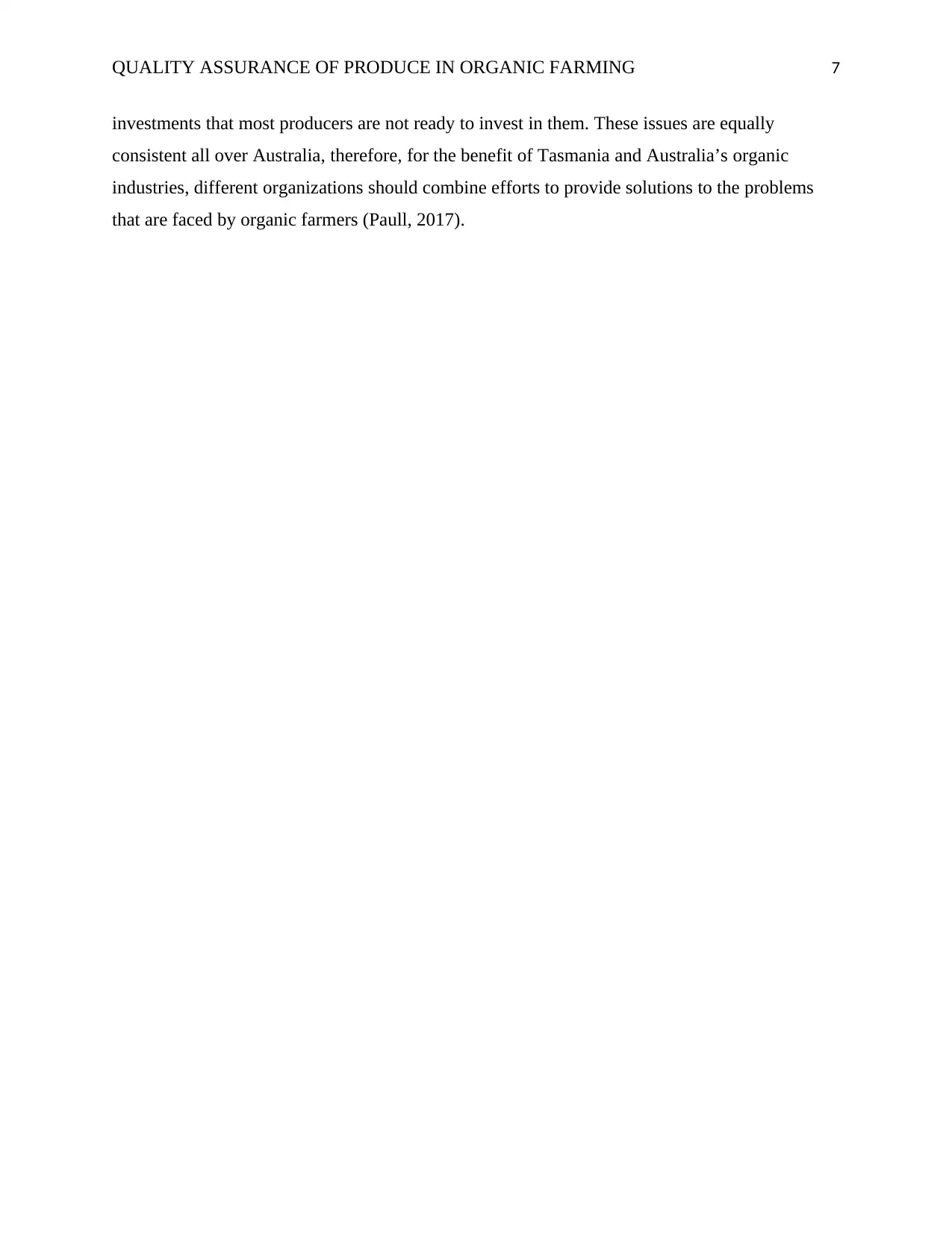
QUALITY ASSURANCE OF PRODUCE IN ORGANIC FARMING 7
investments that most producers are not ready to invest in them. These issues are equally
consistent all over Australia, therefore, for the benefit of Tasmania and Australia’s organic
industries, different organizations should combine efforts to provide solutions to the problems
that are faced by organic farmers (Paull, 2017).
investments that most producers are not ready to invest in them. These issues are equally
consistent all over Australia, therefore, for the benefit of Tasmania and Australia’s organic
industries, different organizations should combine efforts to provide solutions to the problems
that are faced by organic farmers (Paull, 2017).
Paraphrase This Document
Need a fresh take? Get an instant paraphrase of this document with our AI Paraphraser
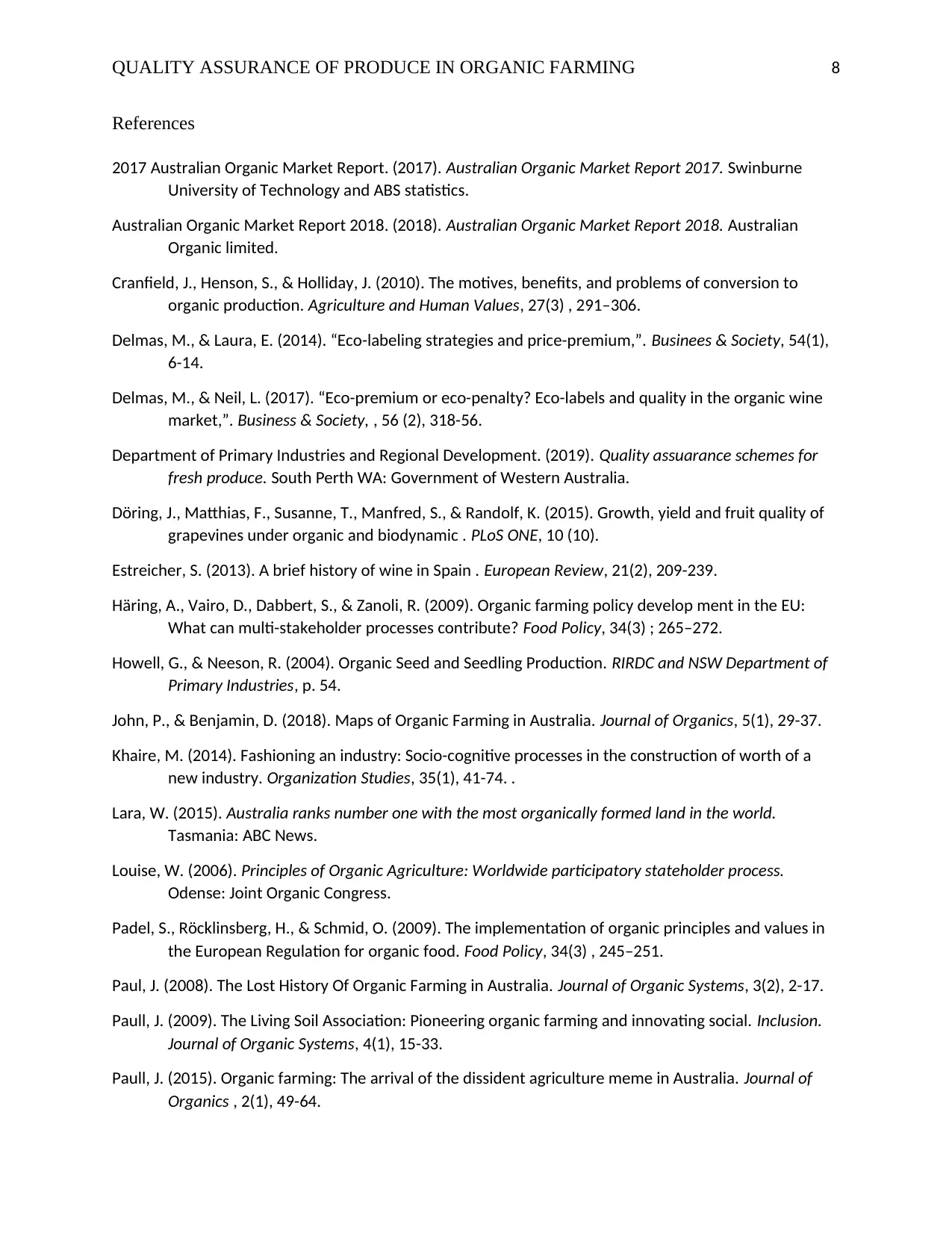
QUALITY ASSURANCE OF PRODUCE IN ORGANIC FARMING 8
References
2017 Australian Organic Market Report. (2017). Australian Organic Market Report 2017. Swinburne
University of Technology and ABS statistics.
Australian Organic Market Report 2018. (2018). Australian Organic Market Report 2018. Australian
Organic limited.
Cranfield, J., Henson, S., & Holliday, J. (2010). The motives, benefits, and problems of conversion to
organic production. Agriculture and Human Values, 27(3) , 291–306.
Delmas, M., & Laura, E. (2014). “Eco-labeling strategies and price-premium,”. Businees & Society, 54(1),
6-14.
Delmas, M., & Neil, L. (2017). “Eco-premium or eco-penalty? Eco-labels and quality in the organic wine
market,”. Business & Society, , 56 (2), 318-56.
Department of Primary Industries and Regional Development. (2019). Quality assuarance schemes for
fresh produce. South Perth WA: Government of Western Australia.
Döring, J., Matthias, F., Susanne, T., Manfred, S., & Randolf, K. (2015). Growth, yield and fruit quality of
grapevines under organic and biodynamic . PLoS ONE, 10 (10).
Estreicher, S. (2013). A brief history of wine in Spain . European Review, 21(2), 209-239.
Häring, A., Vairo, D., Dabbert, S., & Zanoli, R. (2009). Organic farming policy develop ment in the EU:
What can multi-stakeholder processes contribute? Food Policy, 34(3) ; 265–272.
Howell, G., & Neeson, R. (2004). Organic Seed and Seedling Production. RIRDC and NSW Department of
Primary Industries, p. 54.
John, P., & Benjamin, D. (2018). Maps of Organic Farming in Australia. Journal of Organics, 5(1), 29-37.
Khaire, M. (2014). Fashioning an industry: Socio-cognitive processes in the construction of worth of a
new industry. Organization Studies, 35(1), 41-74. .
Lara, W. (2015). Australia ranks number one with the most organically formed land in the world.
Tasmania: ABC News.
Louise, W. (2006). Principles of Organic Agriculture: Worldwide participatory stateholder process.
Odense: Joint Organic Congress.
Padel, S., Röcklinsberg, H., & Schmid, O. (2009). The implementation of organic principles and values in
the European Regulation for organic food. Food Policy, 34(3) , 245–251.
Paul, J. (2008). The Lost History Of Organic Farming in Australia. Journal of Organic Systems, 3(2), 2-17.
Paull, J. (2009). The Living Soil Association: Pioneering organic farming and innovating social. Inclusion.
Journal of Organic Systems, 4(1), 15-33.
Paull, J. (2015). Organic farming: The arrival of the dissident agriculture meme in Australia. Journal of
Organics , 2(1), 49-64.
References
2017 Australian Organic Market Report. (2017). Australian Organic Market Report 2017. Swinburne
University of Technology and ABS statistics.
Australian Organic Market Report 2018. (2018). Australian Organic Market Report 2018. Australian
Organic limited.
Cranfield, J., Henson, S., & Holliday, J. (2010). The motives, benefits, and problems of conversion to
organic production. Agriculture and Human Values, 27(3) , 291–306.
Delmas, M., & Laura, E. (2014). “Eco-labeling strategies and price-premium,”. Businees & Society, 54(1),
6-14.
Delmas, M., & Neil, L. (2017). “Eco-premium or eco-penalty? Eco-labels and quality in the organic wine
market,”. Business & Society, , 56 (2), 318-56.
Department of Primary Industries and Regional Development. (2019). Quality assuarance schemes for
fresh produce. South Perth WA: Government of Western Australia.
Döring, J., Matthias, F., Susanne, T., Manfred, S., & Randolf, K. (2015). Growth, yield and fruit quality of
grapevines under organic and biodynamic . PLoS ONE, 10 (10).
Estreicher, S. (2013). A brief history of wine in Spain . European Review, 21(2), 209-239.
Häring, A., Vairo, D., Dabbert, S., & Zanoli, R. (2009). Organic farming policy develop ment in the EU:
What can multi-stakeholder processes contribute? Food Policy, 34(3) ; 265–272.
Howell, G., & Neeson, R. (2004). Organic Seed and Seedling Production. RIRDC and NSW Department of
Primary Industries, p. 54.
John, P., & Benjamin, D. (2018). Maps of Organic Farming in Australia. Journal of Organics, 5(1), 29-37.
Khaire, M. (2014). Fashioning an industry: Socio-cognitive processes in the construction of worth of a
new industry. Organization Studies, 35(1), 41-74. .
Lara, W. (2015). Australia ranks number one with the most organically formed land in the world.
Tasmania: ABC News.
Louise, W. (2006). Principles of Organic Agriculture: Worldwide participatory stateholder process.
Odense: Joint Organic Congress.
Padel, S., Röcklinsberg, H., & Schmid, O. (2009). The implementation of organic principles and values in
the European Regulation for organic food. Food Policy, 34(3) , 245–251.
Paul, J. (2008). The Lost History Of Organic Farming in Australia. Journal of Organic Systems, 3(2), 2-17.
Paull, J. (2009). The Living Soil Association: Pioneering organic farming and innovating social. Inclusion.
Journal of Organic Systems, 4(1), 15-33.
Paull, J. (2015). Organic farming: The arrival of the dissident agriculture meme in Australia. Journal of
Organics , 2(1), 49-64.
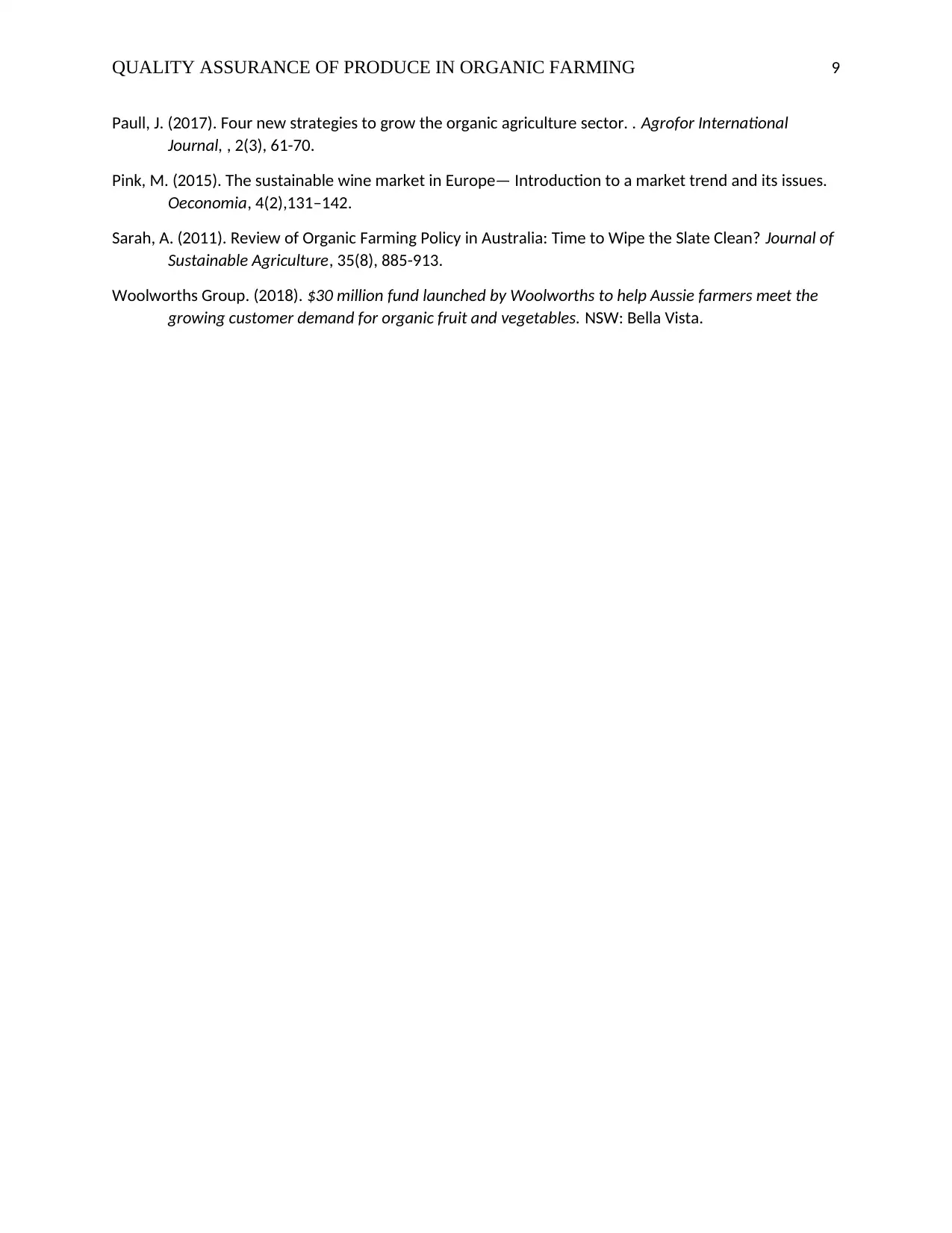
QUALITY ASSURANCE OF PRODUCE IN ORGANIC FARMING 9
Paull, J. (2017). Four new strategies to grow the organic agriculture sector. . Agrofor International
Journal, , 2(3), 61-70.
Pink, M. (2015). The sustainable wine market in Europe— Introduction to a market trend and its issues.
Oeconomia, 4(2),131–142.
Sarah, A. (2011). Review of Organic Farming Policy in Australia: Time to Wipe the Slate Clean? Journal of
Sustainable Agriculture, 35(8), 885-913.
Woolworths Group. (2018). $30 million fund launched by Woolworths to help Aussie farmers meet the
growing customer demand for organic fruit and vegetables. NSW: Bella Vista.
Paull, J. (2017). Four new strategies to grow the organic agriculture sector. . Agrofor International
Journal, , 2(3), 61-70.
Pink, M. (2015). The sustainable wine market in Europe— Introduction to a market trend and its issues.
Oeconomia, 4(2),131–142.
Sarah, A. (2011). Review of Organic Farming Policy in Australia: Time to Wipe the Slate Clean? Journal of
Sustainable Agriculture, 35(8), 885-913.
Woolworths Group. (2018). $30 million fund launched by Woolworths to help Aussie farmers meet the
growing customer demand for organic fruit and vegetables. NSW: Bella Vista.
⊘ This is a preview!⊘
Do you want full access?
Subscribe today to unlock all pages.

Trusted by 1+ million students worldwide
1 out of 9
Related Documents
Your All-in-One AI-Powered Toolkit for Academic Success.
+13062052269
info@desklib.com
Available 24*7 on WhatsApp / Email
![[object Object]](/_next/static/media/star-bottom.7253800d.svg)
Unlock your academic potential
Copyright © 2020–2026 A2Z Services. All Rights Reserved. Developed and managed by ZUCOL.





